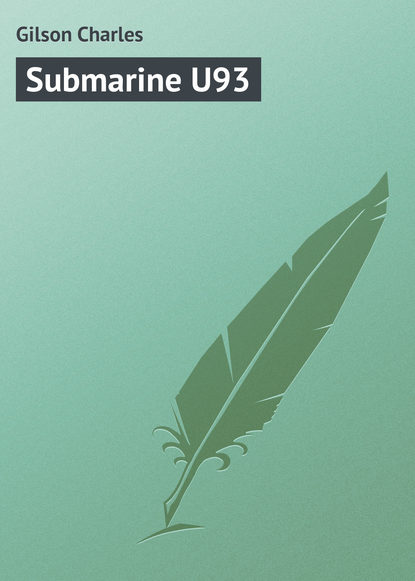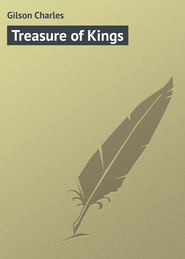По всем вопросам обращайтесь на: info@litportal.ru
(©) 2003-2025.
✖
Submarine U93
Настройки чтения
Размер шрифта
Высота строк
Поля
CHAPTER XXIV-The Tables Turned
In all probability, there was not one of these men who had not been shipwrecked before. They were fishermen by trade, who earned their living at the peril of their lives amid the fogs and shoals of the Dogger Bank. Their forefathers had followed the same calling for generation after generation; and in consequence, this race of hardy men had been bred on the principle of the survival of the fittest. They had become strong, brave and skilful. The sea was at once their natural element and the mother of them all, who gave her gifts unsparingly, but who ever and anon strove to betray and to destroy.
In the warmth of the stokeholds of the "Mondavia," before the opened doors of blazing furnaces, these half-perished men rapidly revived. They were provided with dry clothes; and those who wished it were given a tot of rum.
In the meantime, Captain Crouch, habited once again in the clothes that became him best of all-a rough pea-jacket and a pair of slacks-was seated in Captain Cookson's cabin, with a borrowed pipe between his lips.
Word by word, from the very day when he had set sail from New York with his orders from Mr. Jason, Junior, he told the whole of his story, concealing nothing, neither the details of how he himself had been fooled, the marked gallantry of Jimmy Burke, nor the full perfidy of Stork.
"It's a strange tale," said Captain Cookson, folding his arms and staring hard at Jimmy, who was sound asleep in his bunk. "It's a strange tale; and from the lips of any man but you, Crouch, I should never believe a word of it."
"I don't care a rap," said Crouch, "whether you believe it or not. The point is, you must do what I tell you, or-if you like-give over the command of the ship to me. You've served as my first mate once; I see no reason why you should not do it again."
"And I see every reason," said the other. "In the first place, I've my own orders, which are to take my cargo to Leith. In the second place, though you may be senior to me, and you're a man for whom I have always had a most sincere respect, this ship happens to be under my command, as the papers I carry will prove. I can't shirk my responsibilities, nor do I mean to."
"That's the right spirit!" cried Captain Crouch. "I'm proud to be your friend. And meanwhile, this pipe don't draw, and your tobacco has no more taste than a pinch of hay."
"Then why smoke it?" asked the other with a smile.
"Because," said Crouch, "as far as a man's brain-box is concerned, tobacco acts like steam in an engine-room. It's the motive power, so to speak, if you manage to follow my meaning. Without steam, there's no use in a boiler, a connecting-rod or a shaft. Without tobacco smoke, there's no use in the convolutions of the human brain. That's how it is with me; though I'm bound to confess I can't, as you might call it, get much steam up with a brand of fuel like this."
"It costs fourpence an ounce," said Captain Cookson.
"And that's more than I ever paid for Bull's Eye Shag," said Crouch. "I wouldn't use this stuff to smoke out a wasps' nest. What do you call it-School Girls' Mixture, Fairy Footsteps or some such name as that?"
"No. Navy Cut," said the other.
"And that's an insult to the Royal Navy," answered Crouch. "I reckon a sober-minded British man-o'-war's man wouldn't give it to his youngest baby to chew. If Lord Nelson had smoked a tobacco like that, he'd never have won the Battle of Trafalgar."
"Look here," said Captain Cookson, who had come to the end of his patience; "all I've got to say is this: if you don't like my 'baccy, don't smoke it."
"I won't," said Crouch.
And at that, without any more ado, he hurled the pipe out of the porthole into the sea.
"My favourite pipe!" cried Cookson, springing to his feet.
"That's your misfortune," answered Crouch. "And after all, you're in no worse luck than I am. Still, we waste time, when there is much of importance to discuss. Whether you or I command this ship matters no more than the two buttons on the back of the frock coat of a shopwalker. I and my friends set out in the 'Kitty McQuaire' to run down the 'Marigold,' and we've been hoist on our own petard-as the saying goes. For all that, I'm not disposed to give up the chase. As soon as day breaks, we should sight the fishing-smack with Stork on board; and it's my suggestion that, counting the pop-gun she carries for nothing, we run her down, and serve all on board in the way they treated us."
"You forget the submarine," said Captain Cookson.
"I forget nothing of the sort," said Captain Crouch. "I'm ready enough to take what risks there are."
Cookson thrust both hands deep into his trousers pockets, and strode to and fro in his little cabin. For some moments, he seemed to be deep in thought. Then, at last, his mind made up, he approached his old shipmate, and held out a weather-beaten, horny hand.
"I'm with you, Crouch," said he. "I'm with you, come what may."
Crouch rose to his feet, at the same time bringing the fist of one hand into the opened palm of the other, with a gesture suggestive of the utmost satisfaction.
"Good!" he cried. "There's three men on board who won't be baulked by anything-three men who have sailed the seas together for the greater part of their lives. And there's the boy, too-a rare lad, as I promise you, who knows no more of fear than I about keeping bees. Whisker's in a bad way just at present, but he'll pull round long before morning. He was never born to be drowned; and for the matter of that, neither were you or I."
In spite of the dangers that the morrow was almost certain to bring forth, in spite of the immediate presence of so formidable an adversary as the U93, these two merchant captains-men who had spent the best of their years in facing the manifold dangers of the sea, in every quarter of the globe-laid them down to sleep, as if nothing unusual had occurred, or was likely to occur. Captain Crouch snored lustily; whereas Captain Cookson appeared perfectly comfortable stretched at full length upon the floor, with a rolled-up overcoat doing duty for a pillow.
Jimmy, in the meantime, slept the sleep of pure exhaustion on the comfortable bunk in Captain Cookson's cabin. Soon after his rescue, he had been given some hot soup; and almost immediately after drinking it, he had dropped off into a heavy slumber, from which he did not awake until the first signs of daybreak were far spread upon the eastern skyline.
The first thing he saw was the lean, wiry figure of Crouch, standing in the open doorway, with a large telescope under his arm. On the one side of Crouch was Cookson; on the other, Whisker, who seemed more bulky, more huge than ever, since his great form was silhouetted against the half-light of approaching day.
"That's her, right enough," Captain Crouch was saying. "That's the 'Marigold' that we came out of Hull to look for; and on board of her there's the greatest villain that ever tied a reef-knot or a bowline in a bight."
Jimmy sprang out of bed, and hastily dressed in a suit of seaman's clothes which he found laid out upon a chair. A moment later he was on the main-deck with the three merchant captains, who had come to some sort of mutual understanding that they should command the ship together. They formed a kind of triumvirate, wherein the knowledge, experience and powers of initiative of each were combined and amplified.
Crouch turned to Jimmy, and asked him if he had recovered from the trying ordeal of the previous day. The boy answered that he felt no ill effects; whereat Crouch laughed, and slapped Whisker on the back.
"Here's seventeen stone," said he, "that can no more sink in salt water than a corked-up, empty bottle. Mark my words, my boy, we were not saved as we were at the eleventh hour for nothing. It doesn't do to count your chickens afore they're hatched, but Rudolf Stork's not seen the last of us yet."
Meanwhile, Cookson had run up the bridge steps, where he called both his brother captains and Jimmy to his side.
"There's something suspicious about that smack," said he. "She's got no sail up; I can see no one on board. She's lying just as if she was at anchor."
The daylight was now spreading fast. Already the sun was rising. They were drawing quite near to the "Marigold," which-as Captain Cookson had pointed out-appeared to be deserted and riding lazily at anchor.
As we know, it had been Crouch's intention to run the smack down, to send her to the bottom. Such a light craft would stand but a small chance in a direct collision between herself and the heavy ocean tramp.
However, as they drew near to the "Marigold," it became apparent that once again they had been foiled by Rudolf Stork. Strange-almost miraculous-as it must have seemed at first, the fact remained that Stork and every one of his companions had vanished as completely as if they had been spirited away.
A surprise has this effect upon us all: we lose, for the moment, our natural powers of reasoning; we cannot, as it were, put two and two together. They could not explain this seeming miracle, until, as in a flash, they remembered the U93. There could be no question that Stork and those who were with him had been taken on board the German submarine.
Thus, as at a stroke, were all Captain Crouch's hopes dashed to the ground: his well-laid plans had gone astray. If Stork was already on board the submarine, he had accomplished the very task for which he had been sent out into the North Sea. The U93 had been warned of the coming raid.
There is an old proverb which reminds us that the worm will sometimes turn; and this is exactly what happened now. Crouch had set forth in the "Kitty McQuaire" with the idea of bringing a German spy to his account. At first Stork had been the fugitive; but before the full disc of the round morning sun was visible above the skyline, the tables had been completely turned.
The U93 rose once again from out of the water like some weird, remorseless and formidable monster that lives and has its being in the unfathomable depths of the sea. Almost immediately, two men made their appearance in the conning-tower; and one of these was the commander, whilst the other was Rudolf Stork. By a strange coincidence, there was not another ship in sight, except a trawler, far away to the south.
The U93, in accordance with the design of the very latest submarines, was armed with two quick-firing guns. With both of these, without a moment's delay or hesitation, the Germans opened fire upon the "Mondavia," raking her with shrapnel from end to end.
There was no question now as to who commanded the ship; for the very first projectile burst immediately above the bridge, so that both Whisker and Cookson-who were standing side by side-were struck, the former falling heavily to the ground, whereas Captain Cookson, carrying a hand to his shoulder, cried out that his collar-bone was broken.
Crouch flew to the "telegraph" which communicated with the engine-room below, and shouted his orders for "full steam ahead." He then put the helm hard a-port, and did so only in the nick of time; for the white streak of a torpedo flashed through the water, missing the steamer's rudder by five yards at the most.
There was a kind of fog upon the sea, the surface of which-though by no means calm-was a great deal less troubled than it had been on the evening of the previous day. Captain Crouch recognized at once that their only chance of safety lay in flight. Moreover, two things were necessary: firstly, never to present a broadside to the submarine, which would thereby be offered a suitable target for a Krupp torpedo; secondly, to follow-as far as was possible-a zigzag course, so that a torpedo, if discharged, would probably miss its mark.
There followed, during the early hours of that bleak, sunless morning, a stern chase-a matter of life and death. The "Mondavia" soon proved herself capable of holding her own. Both wind and tide were against the submarine, which also-by reason of the fact that she carried the crew of the "Marigold" over and above her normal complement-was overloaded. The tramp, which was under full steam, had been dry-docked that very autumn; and on this occasion she excelled herself, surpassing all that her builders had ever dreamed of in the way of speed.
None the less, never for a single instant were those on board the steamer out of danger. The forward gun of the U93 spat fire like a cornered cat, raining in quick succession a perfect hurricane of shells upon the unprotected decks. Crouch behaved as he had done on board the "Harlech" when that ship had been under fire from the "Dresden's" guns. He stood steadfast at his post, with Jimmy Burke at his side, giving his orders to the engine-room and to the quartermaster at the wheel, encouraging, both by his example and his words, those whose duty it was to remain upon the deck.
Once, when he looked back, he saw that the submarine had dropped far behind.
"We'll escape, my boy!" he cried. "We'll slip away by the very skin of our teeth."









